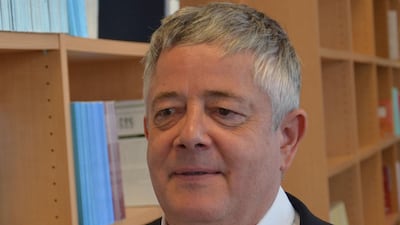A French academic freed last month in an Iranian prisoner swap was told by interrogators at Evin jail that he was only detained to be used as a bargaining chip in negotiations.
Roland Marchal suffered panic attacks and in his first interview since his release spoke of the traumatic psychological impact from more than nine months inside the Tehran prison.
He was detained in June 2019 when he travelled to Iran to visit his partner, a fellow academic at the Paris Institute of Political Studies, who was also arrested. They were held at the same prison accused of plotting against Iranian national security.
His partner, Fariba Adelkhah, a French-Iranian dual national whose published work focuses on Iran and Afghanistan, remains in jail.
She has been on a seven-week hunger strike to demand her freedom that has resulted in damage to her kidneys.
Mr Marchal told Radio France said that he went on a short hunger strike after he was refused telephone calls to his family and was denied books sent from colleagues.
He said he was pulled aside by his interrogators after being questioned and told that he had not been held for anything he had done.
“The interrogator said: ‘This isn’t really about you this is all about negotiations for an Iranian in France. Your time here is just to put pressure on France’.
“I realised that I was just a bargaining chip. That was quite comforting. That meant there would be an end and there would be an exchange.”
He was freed on March 20 after France released an Iranian, Jalal Rohollahnejad, who was wanted in the United States accused of smuggling materials into Iran in breach of US sanctions.
Mr Marchal, an Africa specialist, said that he only learned that his partner had been detained after three weeks when he heard her cry out Azadi – freedom – as she spotted him from another part of the jail.
During his time at the prison, the pair only saw each other four times, including times when they were not allowed to speak to each other.
He said the most harrowing experience was of isolation and the lack of sunlight. “I had no idea why I had been detained, what accusations were how long I was going to be there. It was extremely trying,” he said.
He said he started to lose his memory. He went from the silence of his cell to being shouted at by his inquisitors, who became frustrated when he could not answer their questions.
He said the situation only improved when he was able to see the doctor at the prison infirmary after suffering panic attacks. He said he was drugged with six pills a night to be able to sleep.
“It was a breakthrough for me, I could get back the notion of time,” he said.


